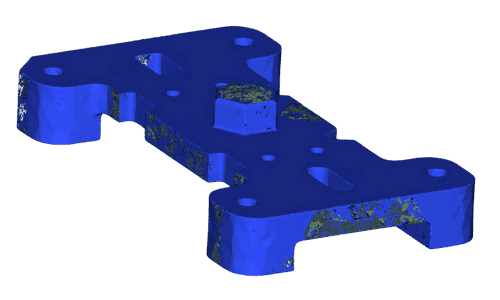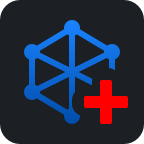Advanced Mesh Healing
Mesh Healing with MeshLIb SDK
Mesh healing is a critical process to prepare mesh for further use in the 3D pipeline, ensuring that mesh models are watertight, error-free, and suitable for applications such as simulation, analysis, and 3D printing. MeshLib SDK emerges as a pioneering solution, offering advanced tools for mesh healing that address common issues like holes, non-manifold edges, and inconsistent normals.

Key Mesh Healing Operations in MeshLib SDK:
- Unite Close Vertices: By intelligently uniting close-proximity vertices, MeshLib SDK eradicates minor gaps and imperfections, ensuring a cohesive and sturdy mesh structure. This operation is essential for models that have undergone extensive editing or have been converted from various formats.
- Component Separation: This feature excels in dissecting a mesh into distinct components, facilitating targeted editing and analysis. Whether dealing with complex assemblies or multipart models, MeshLib SDK simplifies the management of each section for further refinement.
- Hole Filling: With an advanced approach MeshLib SDK seamlessly fills holes, maintaining the original geometry’s curvature and aesthetic. This is crucial for preparing models for real-world applications like 3D printing, where watertightness is non-negotiable.
- Repositioning: This operation offers precise adjustment of mesh vertices, enhancing the model’s structural integrity and visual appeal. Repositioning is invaluable for fine-tuning details and aligning surfaces in preparation for further processing.
- Tunnel Detection: MeshLib SDK’s algorithms identify and rectify tunnels—unwanted pathways penetrating a model. This ensures the model’s integrity, especially in simulation and manufacturing contexts, where such anomalies could undermine the design’s functionality.
- Self-Intersection Resolution: By detecting and resolving self-intersections, MeshLib SDK guarantees the production of error-free meshes. This capability is fundamental for creating models that are both aesthetically pleasing and functionally sound.
- Noise Reduction: MeshLib SDK efficiently smoothens the mesh surface, eliminating noise and irregularities. This enhances the model’s visual clarity and precision, making it ideal for high-resolution simulations and renderings.
- Decimation: This powerful feature reduces the complexity of a mesh without compromising its quality, enabling faster processing and optimization for various applications, including online viewing and interactive gaming.
- Subdivision: MeshLib SDK can increase the density of mesh elements, refining the model’s details and smoothness. Subdivision is key for creating high-quality visuals and detailed simulations.
- Boolean Operations: Offering advanced Boolean capabilities, MeshLib SDK allows for the combination, subtraction, and intersection of meshes. This paves the way for complex modeling tasks, enabling the creation of intricate designs with precision.
- Offset Reconstruction: By rebuilding the mesh with an offset, this operation adds thickness to models, essential for manufacturing processes and creating more robust designs.
In conclusion, MeshLib SDK redefines the standards for mesh healing on the market of 3D processing libraries. Its combination of robustness, precision, and efficiency makes it the go-to solution for professionals seeking to develop a high quality application in their field. Whether you’re developing a software in Dental, Additive manufacturing or any other field MeshLib SDK provides the tools necessary to achieve flawless results.

Why Choose MeshLib SDK for Mesh Healing?
- Robustness: MeshLib SDK offers a comprehensive set of operations for mesh healing, tackling everything from simple fixes to complex topological issues. This robustness ensures that users can prepare their models for any application, be it visual representation, physical simulation, or 3D printing.
- Precision: With MeshLib SDK, precision is paramount. The toolkit’s algorithms are designed to preserve the original intent and detail of the model while correcting errors. This precision is vital for applications requiring high fidelity, such as in engineering simulations and detailed visualizations.
- Efficiency: MeshLib SDK not only excels in accuracy but also in processing speed. Its mesh healing operations are optimized for performance, enabling rapid processing of even the most complex models. This efficiency is a game-changer for projects on tight schedules and for iterative design processes where time is of the essence.

